Copilot is getting a major upgrade and Microsoft is hoping Mico makes you forget you ever met a Clippy
New faces, new groups, real health advice
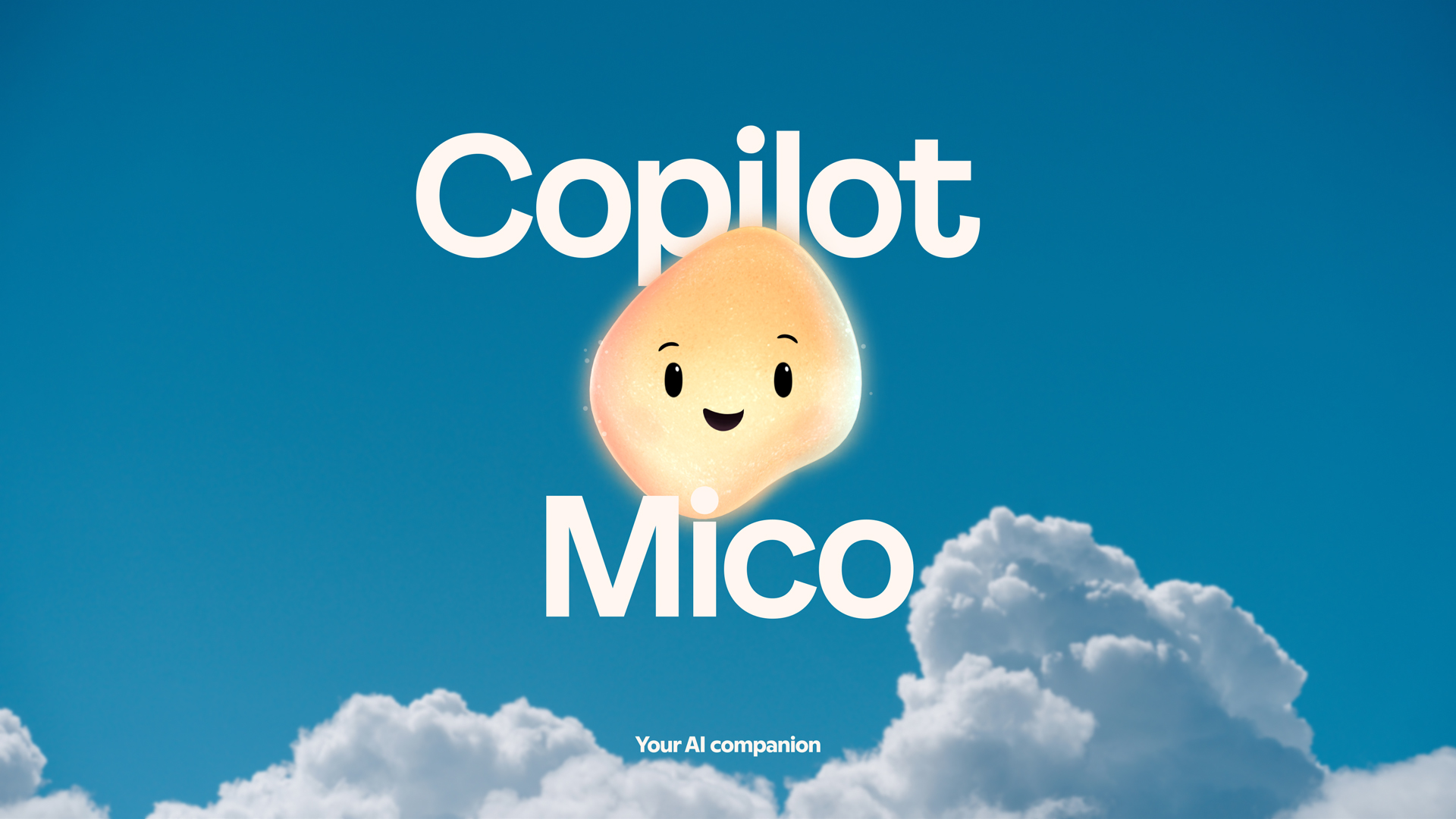
In perhaps one of the most significant updates since Microsoft launched Copilot as Bing AI in 2023, the Windows company is rolling out a dozen Copilot (and Edge) updates, a handful of which are sure to transform your experience with the AI platform.
The updates, which include a new face for Copilot and Journeys to help you digest your online activities and proactively recommend next steps, range from Edge Browser and Windows experiences to the mobile app. They're all free and dropping on Windows 11 (and Windows 10) installations today.
While there are a dozen or so changes, Jacob Andreou, Corporate Vice President, Product & Growth, Microsoft AI, boiled them down for me to four major areas that "he's most excited about."
AI together
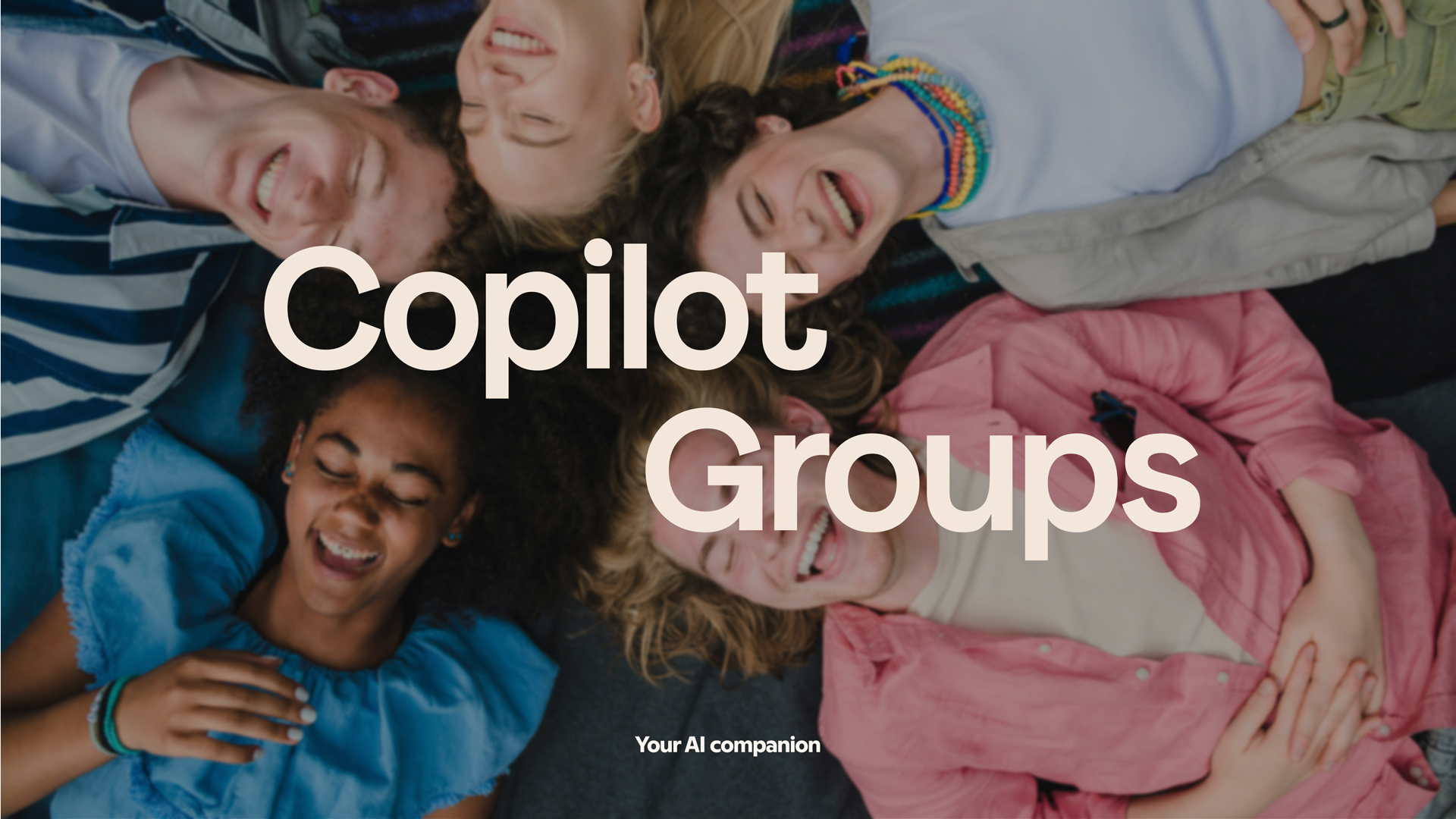
The first and arguably biggest change, and it might be argued one that signals a fundamental shift in how we work with generative AI systems, is Groups.
As the name suggests, Groups lets you invite other people into your Copilot session, and then you can start building prompts together, each asking your own questions, and "collaborate real-time with friends, with classmates, with family," explained Andreou.
Think of it like a group Zoom or FaceTime call, but supercharged by generative AI. The group could brainstorm with Copilot, create drafts, and maybe even set up a study group.
It might also prove useful in situations where, say, you're planning a family trip and want input from all family members. Then you all use Copilot to help add ideas and research about destinations, hotels, and itineraries. At TechRadar, we've found that AI can be quite helpful in planning group vacations.
Sign up for breaking news, reviews, opinion, top tech deals, and more.
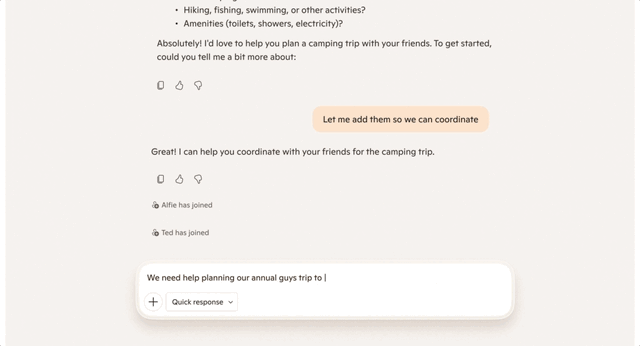
Andreou, who has had access to the new features for some time, recounted using it with his wife to figure out how to transition kittens to more adult cat food.
"I was working with Copilot and figuring out the plan, and I just added her directly to the chat, and she was able to ask the follow-up, so we were able to kind of do it together."
As for how this affects chat history and who can see what, Andreou told me that those invited into the chat will see the prompts and responses related to that chat, but nothing else about your copilot interactions.
"The system stops using memory, as an example, as soon as you bring someone else in, because we want to make sure that, you know, your personal details stay private," he added.
AI personality

Microsoft is also adding more personality to Copilot in the form of "Mico" (a mashup of "Microsoft" and "Copilot"). It's similar to the Copilot app's original blob, but now it has a face.
Andreou called it a "warm, expressive, customizable visual appearance." Its expressions will, in a sense, match your mood. If you enter a sad prompt, Mico may look sad. "It's incredibly performant," Andreou told me, "but all of the technology fades in the background."
It's been a while since Microsoft had an incredibly helpful digital character. I wondered if Mico's face might be a bit Clippy-esque. Andreou laughed and told me, " We have a little Easter egg that's hidden in the product for the people that end up playing with Miko the most, where we're gonna be following in our footsteps of what's come before."
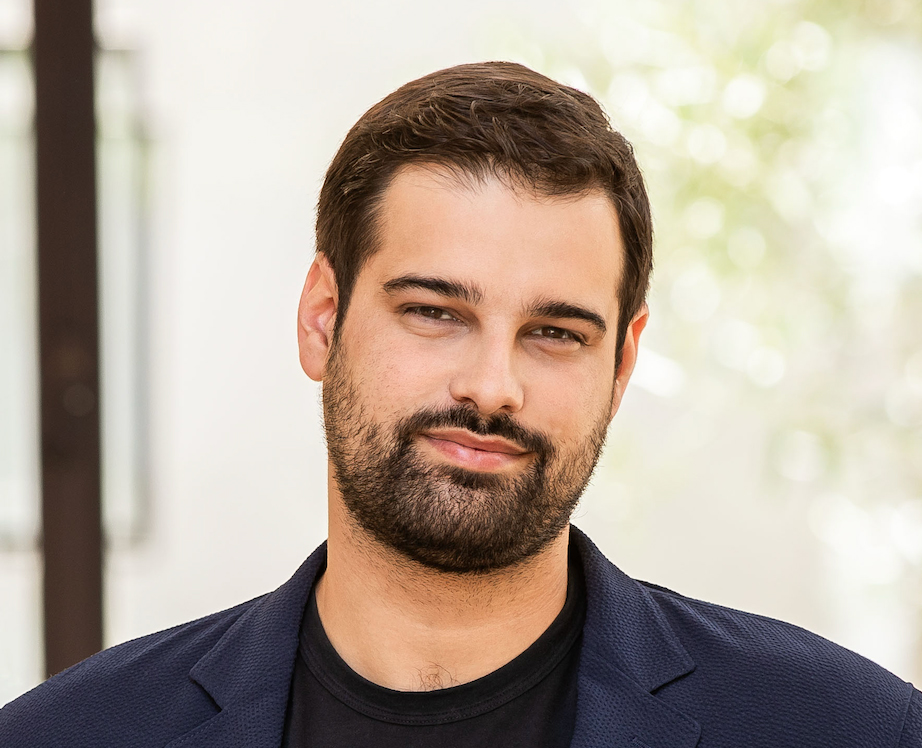
The next update, Real Talk, seems to be a counter to concerns about the overly synchphantic nature of some AI chatbot models. Microsoft calls it its first "personality-forward" model.
Andreou told me it's more witty, adds its own perspective, and can be more challenging.
"It's not just someone who's there to kind of just be a cheerleader... this is a model that actually might really push back and might actually both help you think things through, but also actually spark some deeper conversations."
Unlike OpenAI, which forced the more staid GPT-5 model on everyone, Microsoft is offering Real Talk as an option. Andreou admitted this kind of "conversation" is not for everyone, but some may appreciate it.
"I think it's gonna lead to amazing conversations and a ton of learnings, of attributes, of personality that we will bring back into the overall product over time," he added.
Copilot's memory is also getting an upgrade to better align with the competition, remembering details you share about yourself and your activities. If, for instance, you talk about a family member's birthday in a prompt, Copilot will remember that. "It'll make the interactions and responses feel a lot more natural and a lot more connected, Andreou told me.
Checking up on checking up
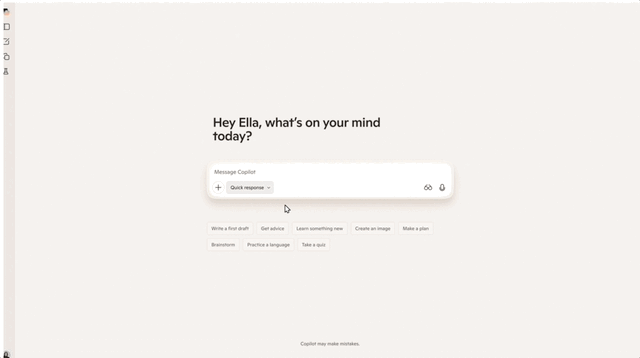
One of the things Microsoft learned about Copilot is that 40% of users ask the AI health-related questions within the first weeks of using the platform. Other studies have found that 1-in-6 adults under 30 turn to ChatGPT for health advice.
It's with those statistics in mind that Microsoft is promising to make all Copilot's health-related responses grounded in "clinical sources." Andreou cited Harvard Health as one of them. Copilot users will see details about clinically trusted sources for each health-related response.
The AI platform, however, will go a step further, connecting you with relevant doctors who are nearby and, if possible, in your coverage network.
"We will never try to be the be-all end-all of these kinds of conversations," said Andreou, "As soon as we think it is appropriate, we will redirect you to find clinicians that can help you to speak to someone in the real world that can help you."
Of course, Copilot can't recommend an in-network healthcare provider unless you share your insurance provider at some point during the chat. It's unclear how many people will be comfortable doing that.
The latest AI browser
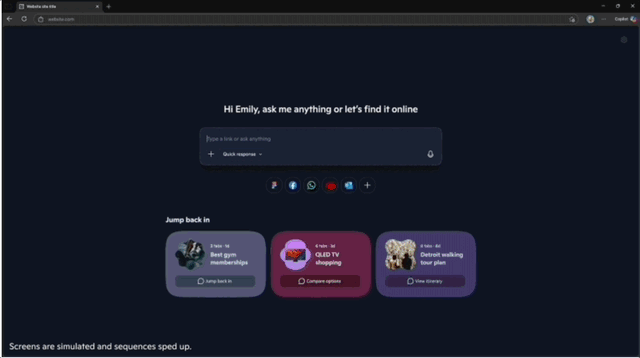
Copilot has been a part of the Edge browser for some time, but just in time for OpenAI's ChatGPT Atlas browser, Microsoft is fully releasing the Copilot Mode in Edge, which the company first teased last July.
There's quite a bit of agentic activity in the browser, like having it review your email and scroll through your social feeds, but Andreou points to the local actions as some of the most powerful new features, including Journeys.
"Journeys looks at your browsing history and basically helps you pick up where you left off." he explained.
Edge and Copilot mode make sense of what you've been up to, and when you return, it's ready with a next step.

Andreou told me he uses Journeys to research new candidates during the job interview process.
"Copilot will often go in the background and try to pull some more information for me and help me jump back in," he added.
Microsoft appears to be going all in on the watchful digital assistant (with your permission, of course, and despite the unfortunate Recall history). Andreou described a redesigned homepage that features recent apps, files, and conversations. It almost sounds like a new Windows homescreen and, in a way, it is.
"You can kind of imagine the new Copilot homepage becoming the starting point for computing on your Windows computer."
A question of models
While much of Copilot has historically been built on OpenAI models like GPT-5, Andreou confirmed they still use a collection of OpenAI models. However, he wasn't prepared to list all the models at work in this major Copilot update.
"At every point in our stack, whether it's the mainline text responding model, the reasoning models we use under the hood, the image generation models that we use, we're constantly evaluating all of the available options that we have to serve our community. And so, that means that in many parts of the product, we still, through our partnership with OpenAI, are serving their state-of-the-art frontier models."
Andreou, though, also echoed other AI-focused tech companies I've spoken to, telling me, "That also means that we want to maintain the flexibility to, in parts of our product, use the best model for the job."
Microsoft later clarified Andreou's comments with this statement:
"OpenAI continues to be our partner on frontier models, and our consumer AI model strategy remains unchanged. We will continue to use the very best models from our team, our partners, and the latest innovations from the open-source community to power our products. This gives us the most flexibility to build AI that delivers the best outcomes across millions of unique interactions every day.”
As for where you'll find these features, which are all available today (October 23), browser actions won't show up in the mobile app, but the app will get Mico.
Microsoft's Copilot experiences differ in another way from those of Google and OpenAI: Most of them are free and, in some cases, you don't even need a Microsoft account. Andreou reminded me that they support Google and Apple accounts. "There is no feature of the twelve that is blocked behind a subscription," said Andreou.
Follow TechRadar on Google News and add us as a preferred source to get our expert news, reviews, and opinion in your feeds. Make sure to click the Follow button!
And of course you can also follow TechRadar on TikTok for news, reviews, unboxings in video form, and get regular updates from us on WhatsApp too.

A 38-year industry veteran and award-winning journalist, Lance has covered technology since PCs were the size of suitcases and “on line” meant “waiting.” He’s a former Lifewire Editor-in-Chief, Mashable Editor-in-Chief, and, before that, Editor in Chief of PCMag.com and Senior Vice President of Content for Ziff Davis, Inc. He also wrote a popular, weekly tech column for Medium called The Upgrade.
Lance Ulanoff makes frequent appearances on national, international, and local news programs including Live with Kelly and Mark, the Today Show, Good Morning America, CNBC, CNN, and the BBC.
You must confirm your public display name before commenting
Please logout and then login again, you will then be prompted to enter your display name.